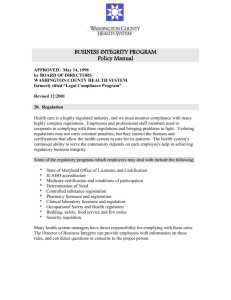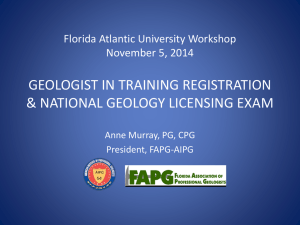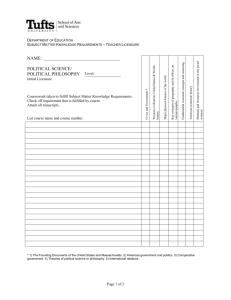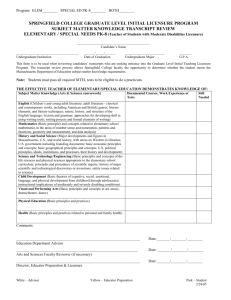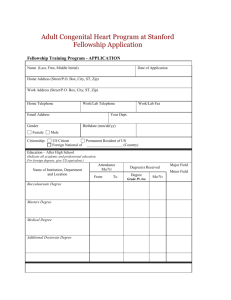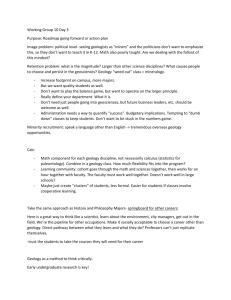What Geology Students Need To Know About Professional Licensure
advertisement
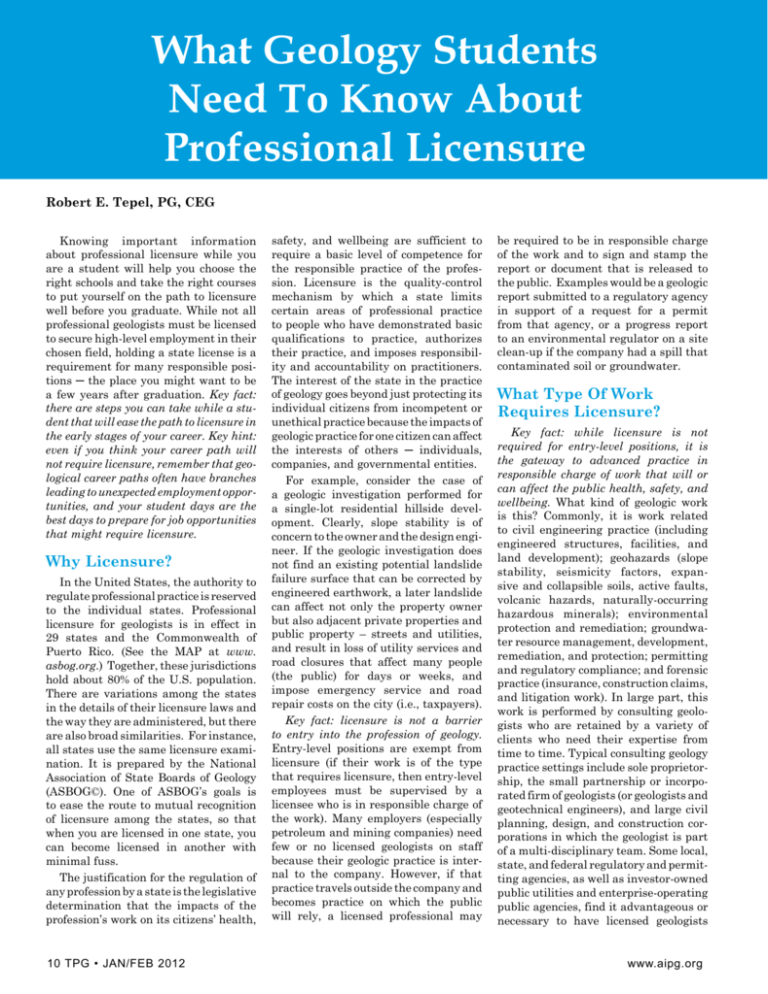
What Geology Students Need To Know About Professional Licensure Robert E. Tepel, PG, CEG Knowing important information about professional licensure while you are a student will help you choose the right schools and take the right courses to put yourself on the path to licensure well before you graduate. While not all professional geologists must be licensed to secure high-level employment in their chosen field, holding a state license is a requirement for many responsible positions ─ the place you might want to be a few years after graduation. Key fact: there are steps you can take while a student that will ease the path to licensure in the early stages of your career. Key hint: even if you think your career path will not require licensure, remember that geological career paths often have branches leading to unexpected employment opportunities, and your student days are the best days to prepare for job opportunities that might require licensure. Why Licensure? In the United States, the authority to regulate professional practice is reserved to the individual states. Professional licensure for geologists is in effect in 29 states and the Commonwealth of Puerto Rico. (See the MAP at www. asbog.org.) Together, these jurisdictions hold about 80% of the U.S. population. There are variations among the states in the details of their licensure laws and the way they are administered, but there are also broad similarities. For instance, all states use the same licensure examination. It is prepared by the National Association of State Boards of Geology (ASBOG©). One of ASBOG’s goals is to ease the route to mutual recognition of licensure among the states, so that when you are licensed in one state, you can become licensed in another with minimal fuss. The justification for the regulation of any profession by a state is the legislative determination that the impacts of the profession’s work on its citizens’ health, safety, and wellbeing are sufficient to require a basic level of competence for the responsible practice of the profession. Licensure is the quality-control mechanism by which a state limits certain areas of professional practice to people who have demonstrated basic qualifications to practice, authorizes their practice, and imposes responsibility and accountability on practitioners. The interest of the state in the practice of geology goes beyond just protecting its individual citizens from incompetent or unethical practice because the impacts of geologic practice for one citizen can affect the interests of others ─ individuals, companies, and governmental entities. For example, consider the case of a geologic investigation performed for a single-lot residential hillside development. Clearly, slope stability is of concern to the owner and the design engineer. If the geologic investigation does not find an existing potential landslide failure surface that can be corrected by engineered earthwork, a later landslide can affect not only the property owner but also adjacent private properties and public property – streets and utilities, and result in loss of utility services and road closures that affect many people (the public) for days or weeks, and impose emergency service and road repair costs on the city (i.e., taxpayers). Key fact: licensure is not a barrier to entry into the profession of geology. Entry-level positions are exempt from licensure (if their work is of the type that requires licensure, then entry-level employees must be supervised by a licensee who is in responsible charge of the work). Many employers (especially petroleum and mining companies) need few or no licensed geologists on staff because their geologic practice is internal to the company. However, if that practice travels outside the company and becomes practice on which the public will rely, a licensed professional may be required to be in responsible charge of the work and to sign and stamp the report or document that is released to the public. Examples would be a geologic report submitted to a regulatory agency in support of a request for a permit from that agency, or a progress report to an environmental regulator on a site clean-up if the company had a spill that contaminated soil or groundwater. What Type Of Work Requires Licensure? Key fact: while licensure is not required for entry-level positions, it is the gateway to advanced practice in responsible charge of work that will or can affect the public health, safety, and wellbeing. What kind of geologic work is this? Commonly, it is work related to civil engineering practice (including engineered structures, facilities, and land development); geohazards (slope stability, seismicity factors, expansive and collapsible soils, active faults, volcanic hazards, naturally-occurring hazardous minerals); environmental protection and remediation; groundwater resource management, development, remediation, and protection; permitting and regulatory compliance; and forensic practice (insurance, construction claims, and litigation work). In large part, this work is performed by consulting geologists who are retained by a variety of clients who need their expertise from time to time. Typical consulting geology practice settings include sole proprietorship, the small partnership or incorporated firm of geologists (or geologists and geotechnical engineers), and large civil planning, design, and construction corporations in which the geologist is part of a multi-disciplinary team. Some local, state, and federal regulatory and permitting agencies, as well as investor-owned public utilities and enterprise-operating public agencies, find it advantageous or necessary to have licensed geologists 10 TPG • JAN/FEB 2012www.aipg.org on their staff. Key fact: increasingly, employers of geologists view employee licensure as a plus for their business and require licensure for higher level technical or supervisory positions as a demonstration of employee professionalism and competence. About The Licensure Exam The ASBOG© licensure exam is an 8-hour multiple choice examination. It is administered in two 4-hour parts: Fundamentals of Geology, and Practice of Geology. The exam is based on a Task Analysis Survey that ASBOG© conducts about every five years. This survey presents a random selection of practicing (licensed) geologists with a list of tasks they typically perform and asks them to rate the tasks by importance in protecting the public. As the nature of professional practice changes with time, this twice a decade survey keeps the exam aligned with the current scope of practice and the body of knowledge that supports it. The exam questions are written by a panel of Subject Matter Experts, and the exam’s distribution of questions by subject matter is based on the responses to the Task Analysis Survey. ASBOG© describes the general subject matter content of its exams in the Test Blueprints in its Professional Geologists Candidate Handbook, available on its web site, www.asbog.org. The Candidate Handbook provides sample questions and additional information about taking the exam and licensure. Commercial study guides and courses are also available. Key point: ASBOG© does not endorse, or give approval to, commercial examination preparation guides or courses. The Fundamentals of Geology part of the exam tests your knowledge of academic subjects important to licensed practice. The Practice of Geology exam contains questions or problems that require more analysis; often there is a scenario set to frame the thinking necessary to answer the question. The Practice of Geology exam reflects the scope of knowledge and problem-solving skills that are used or acquired in the first few years of employment. Applying To Take The Exam Application to take the ASBOG© exam is made to a state board that regulates geologic practice, typically the www.aipg.org board in the state in which you reside or attend college. The ASBOG© web site lists contact information for all state geology boards (click on State Boards). Key hint: in some states, students can take the Fundamentals exam while in their senior year in college. Clearly, if this option is available to you (check the board’s website), this is the best time to take the Fundamentals exam, while the academic knowledge it tests is fresh in your mind. All states that license geologists require 3-5 years of experience before applicants can take the Practice exam. The “Matrix” on the ASBOG© web site summarizes this information, but be sure to review all the information about qualifying for the exam and licensure, on the web site of the state board, so you know you meet all of the requirements. Typically, 30 semester-hours (or equivalent) in geology or closely related classes are required to qualify to take the exam; some states require that a certain minimum number of these be in upper division courses. Key hint: be sure that the course load for your baccalaureate degree matches the state licensure board educational requirements for the state in which your school is located, if you can take the Fundamentals licensure exam as a senior, or matches the state board requirements for the state in which you will take the exam after graduation (perhaps the state that is the location of your first job). Undergraduate Courses That Help Prepare You For The Exam Would you like to be part of the 70+% of test takers who pass the exam on their first try? Take a close look at the Test Blueprint in the Candidate Handbook. Compare the Test Blueprint to your course work and ask, “Am I taking enough courses that cover exam content to give me the background I need for success on the exam?” A review of the Test Blueprint will tell you that the exam is oriented toward applied geology practice. You will recognize that coursework topics needed for success on the licensure examination, in addition to the basic geology courses taken by all majors, include geomorphology, field geology, hydrogeology, engineering geology, Quaternary geology, structural geology, and geohazards. If your curriculum lacks only one or two courses that will supply this knowledge, you might find self-study or a commer- cially available exam preparation course to be helpful in exam preparation. Matching Your Career Goals With Your School’s Program Goals Key hint: many faculty members have little or no knowledge about professional licensure for geologists. Universities have programs and educational goals that match their missions. Some universities with large geology departments are focused on teaching geology to students who want careers in academia or research, and their undergraduate programs are limited to the courses those students need. Other large departments offer a variety of applied courses as part of their catalog. Schools with small geology departments are likely to focus on general courses and might lack faculty expertise and courses in some of the applied geology topics tested by the exam. Other universities or colleges focus on teaching students who want careers in industry, consulting, or government; these are the institutions that will be more likely have many of the courses that match the licensure exam knowledge base. It is up to you, the student, to analyze the match between your career objectives and what your school is prepared to teach you. Final key hint: if you see large gaps between your curriculum and the Test Blueprint knowledge base, review your career objectives. If your planned career path requires licensure, or if you want the career flexibility that licensure offers, you will be well served in both your education and your career by choosing a school that offers courses covering the breadth of the licensure exam. Disclaimer This article is entirely the work of the author and ASBOG© does not, by policy, endorse or approve articles about its examinations. Robert E. Tepel is a licensed geologist in California and Arizona, and a Certified Engineering Geologist in California. His 47-year career emphasized engineering geology for water resources infrastructure. He is a past president of the Association of Environmental and Engineering Geologists. JAN/FEB 2012 • TPG 11
